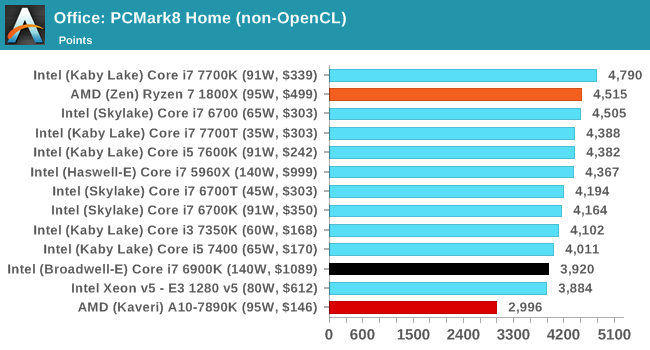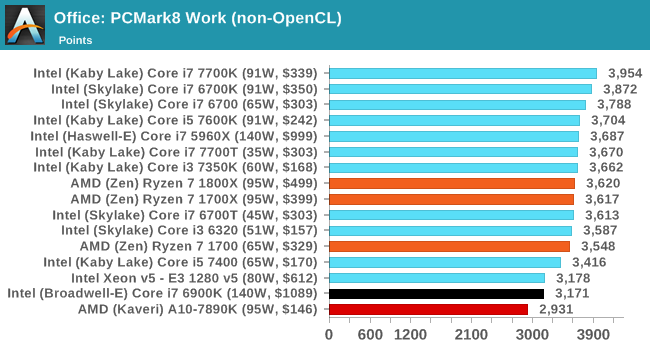The AMD Zen and Ryzen 7 Review: A Deep Dive on 1800X, 1700X and 1700
by Ian Cutress on March 2, 2017 9:00 AM ESTBenchmarking Performance: CPU Office Tests
The office programs we use for benchmarking aren't specific programs per-se, but industry standard tests that hold weight with professionals. The goal of these tests is to use an array of software and techniques that a typical office user might encounter, such as video conferencing, document editing, architectural modelling, and so on and so forth. At present we have two such tools to use.
PCMark8
Despite originally coming out in 2008/2009, Futuremark has maintained PCMark8 to remain relevant in 2017. On the scale of complicated tasks, PCMark focuses more on the low-to-mid range of professional workloads, making it a good indicator for what people consider 'office' work. We run the benchmark from the commandline in 'conventional' mode, meaning C++ over OpenCL, to remove the graphics card from the equation and focus purely on the CPU. PCMark8 offers Home, Work and Creative workloads, with some software tests shared and others unique to each benchmark set. The Creative workload unfortunately seems to fail from the commandline, as the graphical test gives an output of zero (update 3/8: we've found a way around this; will update when we get CPUs retested).


Addendum on 3/8: Originally we posted PCM8 Home scores for Ryzen that were around 3800. On further inspection, these runs were misconfigured due to circumstances beyond our control, and test data is being re-run. The Ryzen 7 1800X in this instance scores 4515.
SYSmark 2014
SYSmark is developed by Bapco, a consortium of industry CPU companies. The goal of SYSmark is to take stripped down versions of popular software, such as Photoshop and Onenote, and measure how long it takes to process certain tasks within that software. The end result is a score for each of the three segments (Office, Media, Data) as well as an overall score. Here a reference system (Core i3-4130, 4GB DRAM, 500GB HDD) is used to provide a baseline score of 1000. A newer version of the benchmark (2014 SE) will be used in future reviews.
A note on contect for these numbers. AMD left Bapco in the last two years, due to differences of opinion on how the benchmarking suites were angled towards Intel processors and had optimizations to show bigger differences than what AMD felt was present. The following benchmarks are provided as data, but the conflict of opinion between the two companies on the validity of the benchmark is provided as context for the following numbers.














574 Comments
View All Comments
BurntMyBacon - Friday, March 3, 2017 - link
@Gothmoth: "gamer... as if the world is only full with idiotic people who waste their lives playing shooter or RPG´s."PC Gaming happens to be one of the few growing areas in the PC market. Not everyone games, but for those that do, the 7700K is still worth considering. Dropping $500 on the 1800X may not be the best call for those that don't take advantage of the parallelism. Of course, the 1800X wasn't really meant for people who can't take advantage of the parallelism. AMD will have lower cost narrower processors to address that gap. I'm curious as to how the performance/price equation will stand once AMD releases their upper end 6c/12t and 4c/8t processors.
Beany2013 - Friday, March 3, 2017 - link
Sod the 1800X - I need a new VM server, and if I want all the threads (sixteen), I can either drop £450 on a Xeon E5 2620 at 2.1-3ghz (cheapest Intel 16 thread option I can find), or I can spend £100 less, and get a Ryzen 7 1700 (3.0-3.7ghz) and put that extra money towards more RAM so I can run more VMs and get more work done.For those of us who aren't high end gamers - which is basically almost everyone, and a far more significant market - these chips may well give Intel a bloody nose in the workstation space; AMD have confirmed they'll use ECC RAM quite happily.
Photographers, videographers, CAD-CAM, developers etc are a bigger market in terms of raw units than high end gamers, and these chips look like being a pretty compelling option as it stands.
Steven R
Beany2013 - Friday, March 3, 2017 - link
(VM server for home, I should have noted - for work, I'll see how the Ryzen based opterons and supermicro mobos etc pan out - money is important in these factors, but I'm not a moron, and I'm not going to run production gear on gaming hardware, natch....)BurntMyBacon - Friday, March 3, 2017 - link
@Beany2013: "I need a new VM server, and if I want all the threads (sixteen), I can either drop £450 on a Xeon E5 2620 at 2.1-3ghz (cheapest Intel 16 thread option I can find), or I can spend £100 less, and get a Ryzen 7 1700 (3.0-3.7ghz) and put that extra money towards more RAM so I can run more VMs and get more work done."It is clear by this statement that you fall into the category of people that can take advantage of the parallelism. Therefore, my statement doesn't apply to your presented in the slightest.
I don't disagree that the Ryzen 7 series has a lot to offer to a lot of people (myself included). If I were in the market today, I'd be looking long and hard at an R7 1700X. The minor drop in gaming performance is less significant to me than the increase in performance for many other tasks I use my computer for. I do a little bit of dabbling in a lot of different things (most of which benefit from high thread count). I have noticed that for the set of applications I have open simultaneously and the tasks I have running, my computer is more responsive with more cores or threads, but single threaded performance is still important to the individual tasks.
In my workflow: (i3 < i5/FX-8xxx < i7 <? R7)
My point was that there is in fact a not so insignificant market of people putting computers together for the primary purpose of gaming. This market appears, by all metrics, to be growing. For this market, Intel's i7-7700K or better yet i5-7600K are still viable options that provide better performance/price than AMD's current options. I'll repeat: "AMD will have lower cost narrower processors to address that gap. I'm curious as to how the performance/price equation will stand once AMD releases their upper end 6c/12t and 4c/8t processors."
Cooe - Sunday, February 28, 2021 - link
"or better yet i5-7600K"Arguably the most short-sited statement in this entire comments section lol. The 4c/4t i5's had roughly equal gaming performance to Ryzen at launch but with ZERO headroom left for the future. This is why the i5-7600K gets absolutely freaking ROFLSTOMPED by the R5 1600 in modern titles/game engines.
JMB1897 - Friday, March 3, 2017 - link
Compelling, but I don't think it's totally there yet. I'd be worried about the memory issues. Increased latency as you add more DIMMs and dual vs quad channel. I'd spend that extra 100 on a Xeon personally.Sttm - Friday, March 3, 2017 - link
Thats who buys off the shelf CPUs thats cost $$$, Gamers. Thats who AMD needs to please with their product. GAMERS. Thats why AMD's stock has been tanking since Ryzen reviews went up, because GAMERS are the demographic that matters when it comes to performance CPU sales.deltaFx2 - Saturday, March 4, 2017 - link
@Sttm: You have an inflated opinion of the impact of gamers. No, AMD's stock isn't tanking because of gamers. I suggest you also look at Nvidia's stock, which is well down from its high of ~120, to ~98. Wed-Friday, Nvidia dropped from 105 to 98, and it dipped below that to ~96 at one point. That's roughly 7-8%. The two stocks are often correlated on drops, with AMD amplifying nvidia's drop. Both do GPUs, see? Some people make tonnes of money shorting AMD (and in recent times have lost their shirt doing so).Here's the truth: All Desktop, as per Lisa Su, is a 5 bn TAM market and gaming is part of this (let's say 50%). Nothing to scoff at, sure, but compared to laptop and server, it's a rounding error. There's NOTHING in these tests/reviews to suggest that AMD will suck in those markets; in fact, quite the opposite: power looks good, perf looks good. AMD's stock (long term) won't tank on the whims of gamers. They help get the mindshare, which is the only reason they're worth catering to (they tend to be a vocal, passionate, and sometimes irrational lot. You won't see datacenter gurus doing the stuff that gamers do. They certainly won't shoot each other over whose GPU is the best).
cmdrdredd - Saturday, March 4, 2017 - link
Believe it or not there are millions of people worldwide who pretty much use their PC for two things. The internet (web browsing, email etc) and gaming. You don't need 16 threads to check email and read forums either so gaming performance is going to be critical. It's not just the CPU performance, it's the entire platform that contributes to Gaming related performance.sans - Thursday, March 2, 2017 - link
Yeah, stick with Intel because Intel is the standard and its products are the best for each respective market. AMD is a total failure.